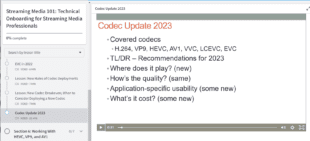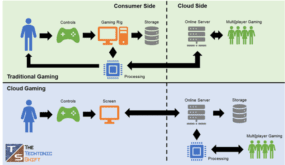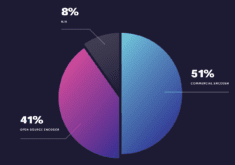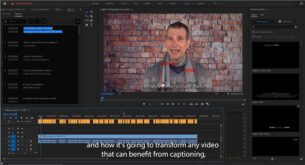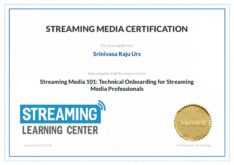My recent column, MPEG LA’s HEVC Licensing Terms Are Flawed, Will Prevent Adoption, has generated lots of comments in the LinkedIn HEVC/H.265 Group. One comment, from Anthony Mai, sparked a lengthy response, which I wanted to share. By way of background, I don’t like the proposed licensing terms for multiple reasons, including:
– They don’t match the expense of the license with the benefit of the new codec. For example, content publishers, who will save millions in bandwidth charges, pay nothing. Encoding vendors, who sell less then the 100,000 minimum number of units, will generate millions in encoding-related revenue, and will also pay nothing.
– It’s a flat tax. So if Adobe includes HEVC in the free Flash Player, they pay as much as Apple will for including HEVC in the $49.99 Apple Compressor.
– It doesn’t promote HEVC deployment in the short term, essentially because Flash is the only avenue to accomplish this, and as drawn up, the licensing agreement makes it highly unlikely that Adobe will license HEVC for the free Flash Player.
Back to the LinkedIn group. Anthony commented:
I think Adobe will still provide free Flash Player, but will have to charge for the plugin that provides HEVC feature. Alternatively they should provide royalty free decoder that supports only a subset of HEVC features. In any case, if the market needs HEVC, then the market will find a way for relevant parties to pay their fair shares.
To which I responded:
Anthony:
Thanks for your comment. I’m not saying Adobe will ever pull the free Flash Player; I’m saying that it won’t have premium features like HEVC (or DASH).
>>>In any case, if the market needs HEVC, then the market will find a way for relevant parties to pay their fair shares.
We just disagree on this, and it certainly hasn’t happened yet for H.264, where many content producers save huge bandwidth costs over VP6/WMV and pay nothing, and encoder companies like Ateme, Digital Rapids, Cisco, Elemental, Harmonics, Sorenson, and Telestream also pay nothing. So it’s hard to argue that many parties who benefit from H.264 are paying their fair share.
The reason Adobe bailed the market out and licensed H.264 was because:
1. They were making much more quarterly income (pre Creative Cloud)
2. They were still investing in Flash as a strategic product (rather than focusing on monetization as they are now)
3. H.264 cost only $5 million as opposed to $25 million
All three of those dynamics have changed and it’s almost inconceivable that Adobe will license HEVC for general distribution in the free Flash player. Unfortunately, with Flash, Adobe is the only company that can impact 95%+ of desktops within 3 months of an implementation decision. And that’s just desktops, not mobile.
On the HTML5 browser front, even if Apple, Google and Microsoft license HEVC for their browsers, which seems likely, none of the major content distributors use HTML5 today because it lacks live, adaptive, true streaming, DRM, captions, etc. So to access the HEVC playback in the browsers, companies will have to develop a custom DASH player, which will likely only be developed on a company by company basis (like Hulu and NetFlix). Only companies with the budgets to spend will be able to leverage HEVC in the browsers, and Firefox uses will be left out in the cold, because Mozilla doesn’t have $25 million to spend. This will all take 12 – 36 months to roll out.
Or, the HEVC patent group could make HEVC playback available instantly by making a deal with Adobe as a special case. They could recoup the revenue by charging encoder companies and content distributors, who certainly would be willing to pay something if they could slash their bandwidth costs or introduce new 4K premium services.
Just my musings. MPEG LA has bright, creative people on staff, and I’m sure they’re working through multiple alternatives to find the optimal solution. I just wanted them to have the benefit of my thoughts (and I had a column due); hence the commentary.
 Streaming Learning Center Where Streaming Professionals Learn to Excel
Streaming Learning Center Where Streaming Professionals Learn to Excel

